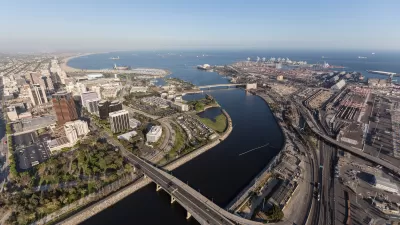In an editorial posted yesterday in Popular Mechanics, national security expert Stephen Flynn argues that Americans are relying on decades-old infrastructure intended for a much smaller passenger and vehicle load.
In an editorial posted yesterday in Popular Mechanics, national security expert Stephen Flynn argues that Americans are relying on decades-old infrastructure intended for a much smaller passenger and vehicle load.
"The fact is that Americans have been squandering the infrastructure legacy bequeathed to us by earlier generations. Like the spoiled offspring of well-off parents, we behave as though we have no idea what is required to sustain the quality of our daily lives. Our electricity comes to us via a decades-old system of power generators, transformers and transmission lines-a system that has utility executives holding their collective breath on every hot day in July and August. We once had a transportation system that was the envy of the world. Now we are better known for our congested highways, second-rate ports, third-rate passenger trains and a primitive air traffic control system. Many of the great public works projects of the 20th century-dams and canal locks, bridges and tunnels, aquifers and aqueducts, and even the Eisenhower interstate highway system-are at or beyond their designed life span."
We have failed both to maintain existing infrastructure and to create a bold vision that should have carried American transportation into the new century.
Most importantly, we are expecting older roads and bridges to support not only a larger number of vehicles, but also a substantial upsurge in vehicle weight and size.
According to the Federal Highway Administration, truck registrations have more than doubled since 1992. Here are the national numbers:
Vehicle Registrations in 2005
Total number of automobiles - 136,568,083
Total number of trucks - 103,818,838
Total number of vehicles – 241,193,974
Vehicle Registrations in 1992
Total number of automobiles – 144,213,429
Total number of trucks – 45,504,067
Total number of vehicles – 190,962,228
These statistics represent the increased use of "trucks" (SUVs, flat beds, minivans) as private vehicles.
Once again, the solution could be to continue to build new roads to sustain an endlessly expending vehicle load. Or we could combine essential road maintenance with serious investment in alternative modes of transportation. That is, invest in rail and smart growth planning to reduce the burden of our car-obsessed lifestyles.

Maui's Vacation Rental Debate Turns Ugly
Verbal attacks, misinformation campaigns and fistfights plague a high-stakes debate to convert thousands of vacation rentals into long-term housing.

Planetizen Federal Action Tracker
A weekly monitor of how Trump’s orders and actions are impacting planners and planning in America.

In Urban Planning, AI Prompting Could be the New Design Thinking
Creativity has long been key to great urban design. What if we see AI as our new creative partner?

King County Supportive Housing Program Offers Hope for Unhoused Residents
The county is taking a ‘Housing First’ approach that prioritizes getting people into housing, then offering wraparound supportive services.

Researchers Use AI to Get Clearer Picture of US Housing
Analysts are using artificial intelligence to supercharge their research by allowing them to comb through data faster. Though these AI tools can be error prone, they save time and housing researchers are optimistic about the future.

Making Shared Micromobility More Inclusive
Cities and shared mobility system operators can do more to include people with disabilities in planning and operations, per a new report.
Urban Design for Planners 1: Software Tools
This six-course series explores essential urban design concepts using open source software and equips planners with the tools they need to participate fully in the urban design process.
Planning for Universal Design
Learn the tools for implementing Universal Design in planning regulations.
planning NEXT
Appalachian Highlands Housing Partners
Mpact (founded as Rail~Volution)
City of Camden Redevelopment Agency
City of Astoria
City of Portland
City of Laramie





























